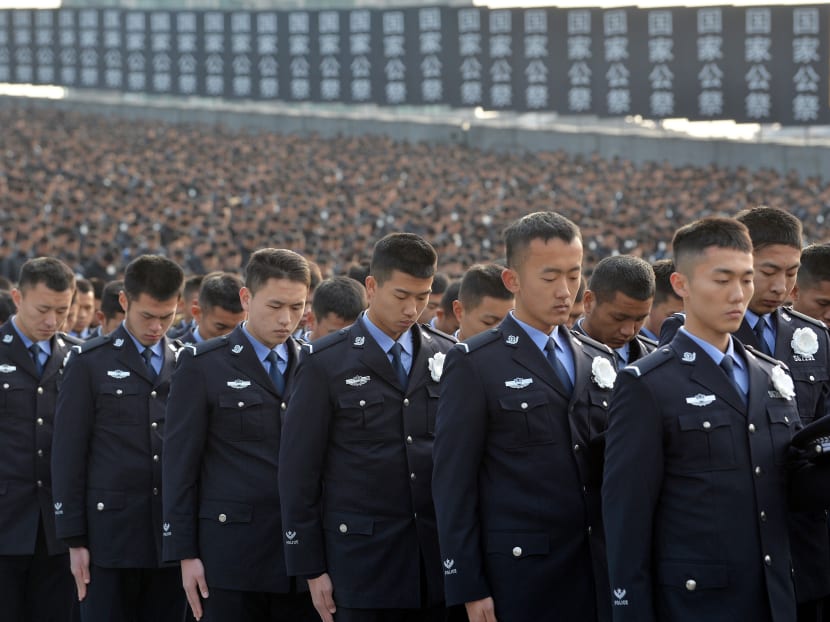China strikes a concilatory tone over Japan as it marks Nanjing Massacre anniversary
NANJING — China marked the 80th anniversary of the Nanjing Massacre on Wednesday (Dec 13) with a call to work with Japan for peace, marking a departure from previous anniversaries where Beijing’s criticisms of past Japanese atrocities soured bilateral ties.

Police pay a silent tribute during a memorial ceremony to mark the 80th anniversary of the 1937 Nanjing Massacre. At the ceremony, a top Chinese official stressed the need for China and Japan to build on their "long, rich history" of links and to deepen their "friendship". Photo: Reuters
NANJING — China marked the 80th anniversary of the Nanjing Massacre on Wednesday (Dec 13) with a call to work with Japan for peace, marking a departure from previous anniversaries where Beijing’s criticisms of past Japanese atrocities soured bilateral ties.
Speaking at a memorial in Nanjing, a top Chinese official said China and Japan were neighbours with deep historic ties.
“China and Japan must act on the basis of both their people’s basic interests, correctly grasp the broad direction of peaceful and friendly cooperation, take history as a mirror, face the future and pass on friendship down the generations,” said Mr Yu Zhengsheng, chairman of the Chinese People’s Political Consultative Conference, a high-profile but largely ceremonial advisory body to China’s parliament.
While vowing never to forget the “great catastrophe” wrought by “Japanese militarism” in a speech to the mourners, Mr Yu also stressed the need for the two rivals to move forward.
“China and Japan are close neighbours, neighbours who can’t move away,” he added in comments carried live on China’s state television, avoiding reference to bitter disputes over the wartime massacre in the city by Japanese troops.
A sombre President Xi Jinping, wearing a white flower in his lapel to symbolise mourning, stood in the audience but did not speak.
Sirens blared and thousands of doves were released to signify peace after Mr Yu finished speaking in front of several thousand black-clad soldiers, civil servants and students with white flowers pinned to their jackets amidst chilly temperatures.
Soldiers carried eight large wreaths representing the decades into the memorial site as sorrowful music played. Mr Xi later met massacre survivors, the official Xinhua news agency said, telling them, "Lessons learned from the past can guide one in the future".
South Korean President Moon Jae-in, who arrived in Beijing for a four-day visit, offered condolences to the victims in a speech to businessmen, in what his office called the first such public mention of the massacre by a South Korean leader.
China and Japan have long sparred over their painful history. China consistently reminds its people of the 1937 massacre in which it says Japanese troops killed 300,000 people in what was then its capital.
A postwar Allied tribunal put the death toll in the eastern city of Nanjing at 142,000, but some conservative Japanese politicians and scholars deny a massacre took place at all.
Officially, Japan concedes that “the killing of a large number of noncombatants, looting and other acts occurred” but says it is “difficult” to determine precise figures.
The issue receded during the Cold War but has re-emerged in recent years, with China now striking an increasingly muscular stance under Mr Xi, while critics say Japanese revisionists have grown bolder under conservative leader Shinzo Abe.
China in 2014 formally made the anniversary a National Day of Remembrance, effectively raising its profile.
In an anniversary speech that year in Nanjing, Mr Xi said the slaughter of 300,000 victims could not be denied, spotlighting the ceremony internationally. He did not attend the next two anniversaries.
Mr Abe, the grandson of a wartime minister who has been accused of trying to gloss over history had in 2015 expressed “deep remorse” for Japan’s actions in Asia.
But he also said future Japanese generations need not continually apologise, drawing criticism in China and South Korea, another wartime victim.
Ties between China and Japan have also been plagued by a long-running territorial dispute over a cluster of East China Sea islets and suspicion in China about efforts by Mr Abe to amend Japan’s pacifist constitution.
However the two countries have sought to get relations back on track, and Mr Abe and Mr Xi met last month on the sidelines of a regional summit in Vietnam.
In Tokyo, Chief Cabinet Secretary Yoshihide Suga spoke of the importance of looking to the future.
“The leaders of Japan and China have agreed in past meetings to further improve relations and it is important, while cherishing this trend, to together show a future-oriented stance,” Mr Suga told a regular news conference.
Liang Yunxiang, an international relations expert at Peking University, said Beijing has kept wartime memories alive as leverage against Japan in modern-day disputes such as maritime territorial squabbles.
“There are current conflicts between the two countries, so historical issues are re-emerging. All history is contemporary,” Mr Liang said.
But fewer than 100 people designated as massacre “survivors” remain alive, and both sides have repeatedly expressed desire to look ahead and avoid rocking their huge trade relationship.
“Xi cannot avoid anti-Japanese movements, as nationalism is a source of his political power. But deep down he must be hoping to improve ties with Japan,” said Mitsuyuki Kagami, professor of China studies at Aichi University. AGENCIES






